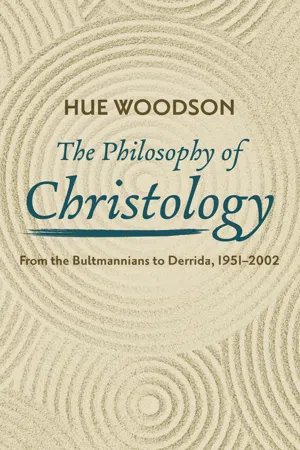![]()
Chapter 1
The Question of the Meaning of Christology (I)
Given that Bultmann has become a representative figure in what Alister McGrath refers to as a “disengagement with history” in The Making of Modern German Christology (originally published in 1994), this disengagement is the methodological heart of Bultmann’s demythologization project. What arises from this disengagement is a de-historicization of what it means to Christology—through Bultmann, the question of the meaning of Christology is detached from historicization through an existentialist interpretation applied to the theologizing of the New Testament. In the wake of a “collapse” in the quest for the historical Jesus proclaimed by Schweitzer, Gerd Theissen and Annette Merz, in Der historische Jesus: Ein Lehrbuch (1996), translated as the Historical Jesus: A Comprehensive Guide in 1998, assert that “the scepticism provoked by these insights was partly absorbed and partly intensified programmatically by [the] theological motives” of Bultmann. To this end, as a consequence of Bultmann, Theissen and Merz write:
Here, Theissen and Merz highlight the difference between what “the quest” was up to Bultmann and how the “new quest” comports itself in a trajectory moving beyond Bultmann. In this, there is also a difference—of both theological and philosophical consequence—in what question is posed towards and what meaning is made in Christology, so that how Bultmann engages in Christological reflection becomes a fundamentally different Christological reflection for “the circle of Bultmann pupils.”
Two of these “Bultmann pupils” that are foundational to what the question of the meaning of Christology becomes are: Ernst Käsemann and Günther Bornkamm—for Käsemann and Bornkamm, Theissen and Merz find that “the quest for pre-Easter support for the kerygma of Christ is independent of whether Jesus used [C]hristological titles.” Theissen and Merz suggest that “this claim is implicit in [Jesus’] conduct and his proclamation.” This is, of course, part and parcel of a Christological reflection, though the conclusions Käsemann and Bornkamm reach are calibrated differently theologically and, by extension, philosophically. In one sense, Theissen and Merz view Käsemann’s Christological reflection “as Jesus’ criticism of the Law, which puts in question the foundations of all ancient religion, [as] a ‘call of freedom.’” In another sense, Theissen and Merz view Bornkamm’s Christological reflection “as the immediacy of Jesus by which he is distinguished from the apocalyptic and casuistry of his environment.” Together, Käsemann and Bornkamm contribute to a specific post-Bultmannian approach to the question of the meaning of Christology as a theological starting point that stands contextually closest to Bultmann and become, then, two essential voices in what it means to do Christology.
Ernst Käsemann
As Bultmann’s doctoral student at Marburg, Ernst Käsemann (1906–98), who was “from the very beginning [the] most independent of all of Bultmann’s students”—having completed his dissertation in 1931 on Pauline ecclesiology entitled “Leib und Leib Christi” translated as “Body and Christ’s Body” (eventually published in 1937), with his habilitation thesis completed in 1939 on the Epistle to the Hebrews (translated as The Wandering People of God in 1984)—initiated what eventually became known as a second quest for the historical Jesus in 1951 with Käsemann’s inaugural lecture as professor of New Testament at the University of Göttingen. In 1953, as Gregory W. Dawes notes, Käsemann delivered the lecture to a “reunion of former students of the Marburg theological faculty.” This lecture was subsequently published in 1954 as “Das Problem des historischen Jesus” or “The Problem of the Historical Jesus” (appearing in Exegetische Versuche und Besinnungen, published in 1960, selectively collected in Essays on New Testament Themes in 1964)—Käsemann’s position differed from Bultmann’s, in the sense that Bultmann emphasized a deeply theological interpretation of the New Testament over a historical one, while Käsemann maintained a historical interpretation, believing that the texts of the New Testament provide historical information from which a historical Jesus can be meaningfully constructed.
What resulted in Käsemann’s stance on the meaningfulness of the historical Jesus over and against Bultmann’s was a “new quest” for the historical Jesus, as Witherington acknowledges. Essentially, to Dawes’ point, Käsemann is “responsible for re-opening the question.” Though that question, as that which undergirds a “new quest,” as Käsemann envisions it, owes its conceptualization to Bultmann’s influences on Käsemann, the manner with which Käsemann approaches and articulates the question of the meaning of Chr...
